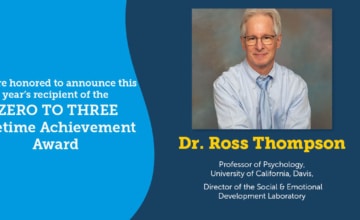Millions of families across the nation left without support after months of empty promises
Following reports of a Senate framework for a reconciliation package that fails to address the nation’s floundering child care system, advocates, families, and early childhood educators raised their voices in outrage that their elected officials have failed to support them yet again. ZERO TO THREE, the country’s leading early childhood development nonprofit dedicated to ensuring all babies and toddlers have a strong start in life, demanded Senators return to the negotiating table to properly provide for the millions of young children and their families who have suffered greatly over the past few years.
ZERO TO THREE Chief Policy Officer Miriam Calderón stated:
“This is a devastating message from the Senate to families who struggled throughout this pandemic and who have seen family-centered policy after policy dropped from the national agenda until only child care remained – and now, that’s gone as well. For years, even before the pandemic, our child care system has been undervalued and woefully underfunded at every level, failing children, families, and professionals. This budget reconciliation package is our chance to finally begin investing in a system that would help our children learn and grow, support families’ abilities to work, and recognize and reward early educators for the critically important work they do. We still have that opportunity, but as of now the Senate is again failing to keep their promises to their youngest constituents.
“The science is clear – the first few years of life are critical to the growth and development of babies and toddlers. They need and deserve high-quality care that builds a strong foundation for their futures. Without it, we fail our babies – particularly those with the least access to quality, affordable care – our babies of color and those in families with low income. When we invest in family-focused policies like child care, our families and communities thrive. When we tolerate grave disparities, our future is weakened.
“These past few months have seen the collapse of families’ hopes for supportive policies with the expiration of the expanded Child Tax Credit; a failure to pass a national paid family and medical leave law; and now an abandonment of support for our child care system – the only remaining piece of this legislative puzzle directed at young children. This is a devastating turn of events that will leave families of young children struggling to stay afloat. Our Senators must return to the negotiating table at once to ensure sustained funding for child care is included in a final reconciliation package. Our elected officials have ignored their responsibility to our babies for too long, and it’s time for them to finally step up on their behalf.”
A proposal from Sens. Patty Murray (D-WA) and Sen. Tim Kaine (D-VA) included critical support for child care and early learning in the reconciliation package, providing much needed long-term investments in increasing the supply of quality care and supporting early educator wages. But despite significant support in the Senate and House alongside advocates, families, and early educators, the proposal is not included in the reconciliation framework the Senate seems poised to advance.
ZERO TO THREE’s State of Babies Yearbook: 2022 highlights the importance of investing in early childhood education on a national and state-by-state level. Findings show:
- Just 4.6 percent of low- or moderate-income infants and toddlers receive a child care subsidy.
- Only 11 percent of those income-eligible infants and toddlers have access to Early Head Start, where families can get comprehensive child development and family support services.
- RAPID Survey data show that child care shortages remain a major challenge as most providers struggle to recruit and retain qualified staff due to low wages and benefits, health and safety concerns and burnout.
- Parents, even when they can find child care, have faced increased disruptions and rising costs, negatively impacting their own emotional well-being and ability to work, as well as their children’s well-being.
- Compensation remains unavailable for many child care providers who have remained working – in February 2022, one in three child care providers reported experiencing hunger.
To learn more about the importance of investing in child care and other policies supporting babies, toddlers, and their families, visit thinkbabies.org.


